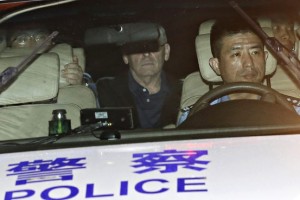By Stanley Lubman

A Chinese police vehicle. Reuters
Headlines about China are filled with reports of Chinese citizens — some well-known, some less so — who have been detained, arrested or indicted. Recent cases, for example, include those of activist lawyer Pu Zhiqiang, first detained and then arrested for the crime of “picking quarrels,” as well as that of TV journalist Rui Chengang, who was recently detained. The array of terms used to describe the different powers and tactics available to the Chinese police is enough to make both readers and journalists struggle. The terminology varies, and is often used without explanation. For example, news organizations sometimes use the terms “detained” and “arrested” as if the two terms are synonymous.
As China’s political-legal system presses vigorously to maintain “social stability,” the number of different terms used is further complicated by the various actors and agencies involved, including public security (“police”) forces and the procuratorate (“procuracy”). At the same time, Chinese President Xi Jinping’s campaign against corruption is being conducted by the Chinese Communist Party, which follows its own rules until it turns over an accused party member to the formal legal system.
The problem is deepened by the fact that Chinese police use not only legal, but extra-legal powers to deprive or limit the personal liberty of people authorities claim present threats to “social stability.” Between mid-May and early July, for example, more than 130 individuals were “criminally detained,” “administratively detained,” “arrested,” ”forced to travel,” “taken away,” “put under surveillance,” “taken into temporary custody,” or “home searched” by the Chinese police, according to the latest report by nonprofit Human Rights in China. One was “disappeared.” By July 8th, 36 had been released.
